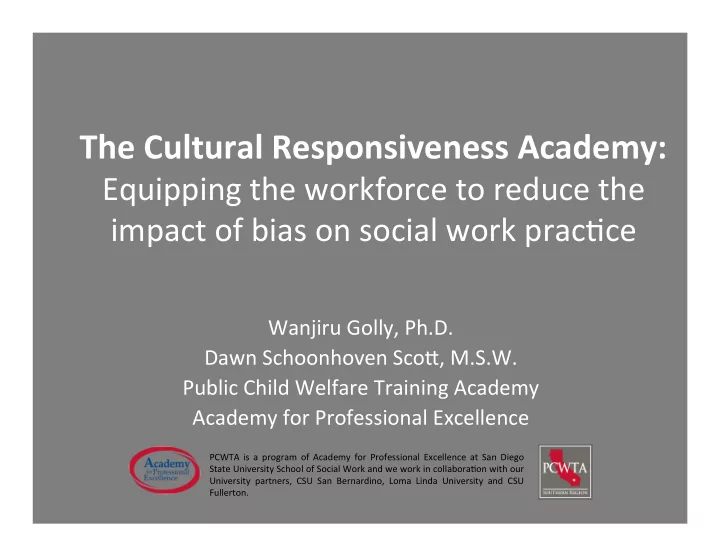

The Cultural Responsiveness Academy: Equipping the workforce to reduce the impact of bias on social work prac8ce Wanjiru Golly, Ph.D. Dawn Schoonhoven ScoC, M.S.W. Public Child Welfare Training Academy Academy for Professional Excellence PCWTA is a program of Academy for Professional Excellence at San Diego State University School of Social Work and we work in collabora8on with our University partners, CSU San Bernardino, Loma Linda University and CSU Fullerton.
The business of change.
Change is hard.
Change is risky.
Change is good.
Change is possible.
Today’s Goals • Facilitate open and honest conversa8on among child welfare professionals about cultural responsiveness • Foster a climate of support and cultural humility by par8cipa8ng in insight-building, skill-based ac8vi8es • Consider strategies that will support systemic changes, reduce the nega8ve impact of bias on decision-making, and develop a process to change the landscape of injus8ce
Ques8on: What makes change possible?
Defining the Problem Dispropor8onate placement of children of color has been a long standing issue Bias impacts social work prac8ce (as indicated by an overrepresenta8on of African American, La8no and Na8ve American kids in care and research) Agencies and the community have expecta8ons that workers operate in a culturally responsive manner Change is hard…but possible
Collabora8on County of Public San Diego Child Child Welfare Welfare Training Services Academy
Leveraging What We Know Engage the Community: Fairness and Equity CommiCees, workgroups with key stakeholders Iden;fy Par;cipants: Statement of Intent Complete E-Learning : Founda8onal Knowledge about Historical context In-Person Classroom Training : 6 months in-person (1 day/month) Coaching : Individual or small group Prac;cum Project -small group projects Presenta;on : CRA peers, agency leaders, and community Stakeholders
Par8cipants • Introduc8on to the CRA Manager/Policy • African American Experience & Worldview • Impact of Historical Trauma on African American Families Analyst Cohort • Iden8fying and Managing Bias • Engaging African American Families • Succession Planning and Coaching • Introduc8on to the CRA PSS/SPSW/PSW • African American Experience & Worldview • Impact of Historical Trauma on African American Families Cohort • Iden8fying and Managing Bias • Engaging African American Families • Cross Cultural Supervision • Introduc8on to the CRA Support Staff • African American Experience & Worldview • Impact of Historical Trauma on African American Families Cohort • Iden8fying and Managing Bias • Engaging African American Families • Customer Care
Ques8ons?
Gathering and U8lizing Feedback Upgrade Pre- model and assessment curricula as survey needed Follow Up Sa8sfac8on Surveys surveys Gathering Focus qualita8ve Groups feedback Monthly Connec8ng mee8ngs the learning with across leadership cohorts
Summary of Evalua8on • Individual Level Surveys : – General Demographic Survey (CRA par8cipants) – ACri8on survey (par8cipants who sign up to aCend but do not) – Demographic survey of those in poten8al par8cipant pool but did not aCend training – Feedback survey at the end of each class – Feedback survey at the end of each coaching session – 6 month follow up survey to all par8cipants
Summary of Evalua8on • Organiza8onal Surveys: – Pre-assessment survey to all staff – Quarterly organiza8onal surveys • Embedded Evalua8on: – Classroom training evalua8ons • Trainer Evalua8on: – Observa8on and survey completed by PCWTA staff • Focus Groups: – Completed with par8cipants acer comple8on of the program
CRA Pre-Assessment Survey 256 pre-assessments were • 39% Caucasian/White collected: 208 self-iden8fied • 26% Hispanic/La8no(a) their ethnicity 2% Ethnicity Most respondents less than 5 1% years in their current posi8on African African American Asian Caucasian/White Hispanic/La5no(a) Middle Eastern Mul5-Racial Pacific-Islander Other 4% 2% 7% 15% 93.12% confident in working with diverse popula8ons 4% 97.36% excited to learn more 26% about different cultures 39% 68.87% reported that their region/program provides good culturally-relevant services
Mid Year Feedback Survey Results • 10-ques8on survey • Asks about learning objec8ves, inclusion of of best prac8ce in training, clear and effec8ve content, effec8ve training delivery, sa8sfac8on with material • 1-5 scale with 5 being the highest ra8ng • Consistently across all cohorts – mean score of 4.54
“I have gained the courage to discuss dispropor8onality in my region with other coworkers outside of the CRA. I feel empowered and understood as a black woman in this Agency and I feel like my concerns are being met with regards to African American children in our system along with their families.” ~ Social Worker, Child Welfare Services
“The most successful component of the CRA has been the prac8ce ac8vi8es in the classroom . They have allowed me to do a deeper self- examinaCon, be open to hearing feedback from others, and think about specific behavioral changes I can make . ” ~ Deputy Director, Child Welfare Services
“I have no8ced I am more conscious and aware that my percepCon and experience could be completely different from someone else’s.” ~ Policy Analyst, Child Welfare Services
“An example of something I am taking away from CRA is that I will listen more intently to clients when they describe their family’s experience . This will help with my understanding and allow me to help with their understanding of our system.” ~ Social Worker, Child Welfare Services
Crea8ng Family Symbols • Using the paper and markers provided, please draw a symbol that represents your family.
Go change.
Ques8ons?
For more informa8on, please contact Dawn Schoonhoven ScoC Dschoonhoven@mail.sdsu.edu Some por8ons of this presenta8on were adapted from the CRA presenta8on at the CalSWEC Title IV-E Summit. PCWTA is a program of Academy for Professional Excellence at San Diego State University School of Social Work and we work in collabora8on with our University partners, CSU San Bernardino, Loma Linda University and CSU Fullerton.
Recommend
More recommend